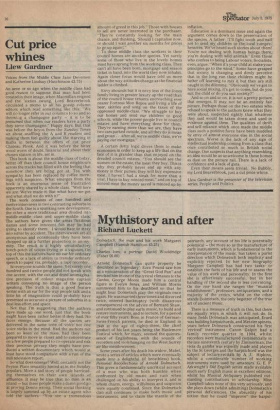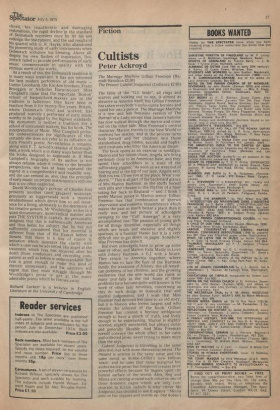Mythistory and after
Richard Luckett
Dolmetsch: the man and his work Margaret Campbell (Hamish Hamilton £5.25) Charles Ives: a portrait David Wooldridge (Faber £6.00) Arnold Dolmetsch Can quite properly be described as 'legendary': Ezra Pound saw him as a reincarnation of the 'Great God Pan" and invoked him in one of the lyrical climaxes to the Cantos, George Moore made him a central figure in Evelyn Innes, and William Morris summoned him to his deathbed so that he might hear Dolmetsch play the virginals once again. He was married three times and divorced twice, entered • bankruptcy (with disastrous consequences) on the advice of Bernard Shaw, and continued to play early music, to build and restore instruments, and to lecture, for a period of over fifty years. Born in France of GermanSwiss-French parents, he died in England in 1940 at the age of eighty-three, the chief product of his last years being the Haslemere Festival which, for many, seemed the quintessence of Englishness, with the sounds of recorders and viols hanging on the West Surrey air like rneadowsweet..
Some years after his death his widow, Mabel, wrote a series of articles which were eventually made into a delightful (if breathless) book, Personal Recollections of Arnold Dolmetsch. This gives a fundamentally uncritical account of a man who was both humble when confronted by old music and vain when challenged on his ability to interpret it, and in whom charm, energy, wilfulness and suspicion were equally combined. Since the Dolmetsch clan still continues to make both music and instruments, and to claim the mantle of the
patriarch, any account of his life is potentially polemical — the more so as the manufacture of early instruments, which is fundamental to the interpretation of the music, has taken a purist direction which Dolmetsch both implicity and explicitly rejected. In her new biography Margaret Campbell has had two tasks: to establish the facts of his life and to assess the value of his work and personality. In the first she is effortlessly successful, but in her handling of the second she is less convincing. On the one hand she ranges the -musical establishment", professors, antiquarians, and a majority of the critics, whilst on the other stands Dolmetsch, the only begetter of the true art of ancient music.
There is a measure of truth in this, but there are equally ways in which it will not do. In many fields Dolmetsch was anticipated: Erard was building harpsichords, and Metzler spinets, years before Dolmetsch constructed his first 'revived' instrument. Canon Galpin had a family recorder quartet in 1904, whilst recorders were manufactured commercially, in the late nineteenth century by Zimmerman; the viola da gamba was expertly made and played by the St Georges and the harpsichord was the subject of lecture-recitals by A. J. Hipkins, whilst a considerable number . of working instruments were used by amateurs. G. E. P. Arkwright's Old English series made available much early English music in excellent editions, whilst his Musical Antiquary published out. standing contributions to scholarship. Miss Campbell takes none of this very seriously, and she plays down (whilst admitting) Dolmetsch's personal deficiencies, the absurdity of his notion that he could "improve" the harpsi Chord, his inauthentic and damaging restorations, the rapid decline in the standard of Dolmetsch recorders once he let his son redesign the instrument, and the sad results of his quarrel with G. R. Hayes, who abandoned his pioneering study of early instruments when Dolmetsch withdrew his blessing. Above all, despite his own flashes of inspiration, Dolmetsch failed to provide performances of early music commensurate in quality with the intrinsic merit of the works.
As a result of this the Dolmetsch tradition is in many ways irrelevant. It has not informed the best modern performers of old music Gustav Leonhardt, the Kuijken brothers, Franz Brueggen or Nicholas Harnoncourt. Miss Campbell's claim that the important 'Boston' school of harpsichord-makers are in the tradition is ludicrous; they have been in reaction from it for twenty-five years. Britain, where Dolmetsch lived and worked, has produced scarcely a performer of early music worthy to be judged by the highest standards. His monument is neither a tradition nor a school of instrument makers, but his book, The Interpretation of Music. Miss Campbell probably underestimates the significance of this; certainly she does not refer to its influence on Ezra Pound's poetic. Nevertheless it remains, along with F. T. Arnold's treatise of thoroughbass, a work which is in many ways better than the books designed to supersede it. If Miss Campbell's biography of its author is not always reliable when it comes to the broader perspectives, she has at least captured the legend in a comprehensive and readable way, and she can remind us, also, that the principle of early music on proper instruments is still one that is too often neglected.
David Wooldridge's portrait of Charles Ives presents another (and greater) musician, genuinely at loggerheads with a musical establishment which drove him to sell insurance for a living, ultimately to the detriment of his creative powers. Mr Wooldridge writes in a quasi-documentary, quasi-radical manner and puts THE SYSTEM in capitals. He presumably imagines that this is authentically American and thus befits his subject. But he has not sufficiently considered that his material is different from that of the Essays before a Sonata, that there is a loss of stance in imitation which damages the clarity with which a case can be advanced. His anger at the treatment which Ives has received after his death (from conductors and recording companies) as well as before is understandable. But Ives is great enough to make this kind of rhetoric unnecessary, and his admirers will regret that they must struggle through Mr Wooldridge's prose to get at the many admirable points which he throws away.
Richard Luckett is a lecturer in English Literature at the University of Cambridge



































 Previous page
Previous page